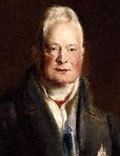| William Henry was the third son of King George III. As a younger son, whose chances to assume the throne were only theoretical, he entered the British Navy in 1779 at the age of 13. William fought in the American War for Independence (1775-1783) and served in the West Indies. He remained in service until 1787. On his returning to England he angered his father by his numerous love affairs and 10 illegitimate children. On the death (6 Nov 1817) of Princess Charlotte Augusta, only legitimate child of William's elder brother, George IV, the second brother, Frederick Augustus, Duke of York and Albany, became heir presumptive. When the Duke of York also died of dropsy (5 Jan 1827), William remained the only male heir. He served as First Lord of the Admiralty (Apr 1827 - Sep 1828) in the three Tory cabinets. In 1830 William acceded to the throne as William IV and almost immediately faced the defeat of Tories at the General Election (July 1830). In reply to the king's speech, Earl Grey, as a Whig leader, called for parliamentary reform. After the defeat of the Wellington's government in the Commons, the king was forced to ask Grey to form a ministry. Another General Election (April 1831) resulted in a landslide victory for those in favor of reform. William conceded to the Grey's request to create more peers to get the Reform Bill through, but it proved unnecessary as the bill was passed and received the Royal Assent on 7 Jun 1832. The reform of Parliament was followed by the abolition of slavery throughout the British Empire (1833), the reform of the poor laws (1834), and the Municipal Reform Act (1835). The attempt of William IV, whose sympathies lay with the Tories, to remove Lord Melbourne from office (December 1834) failed as the Whigs retained majority after the General Election (January 1835). Biography source: [1] |

